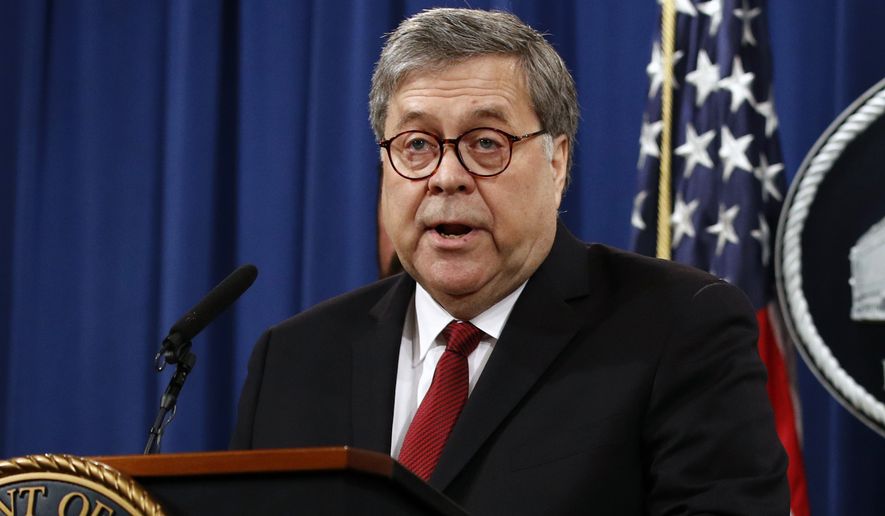Attorney General William P. Barr on Tuesday railed against federal courts issuing nationwide injunctions blocking President Trump from implementing his policies, saying they wield “unprecedented power.”
In a speech before the American Law Institute, Mr. Barr said such injunctions block politicians of all stripes from enacting the voters’ will.
“One judge can, in effect, cancel the policy with the stroke of the pen,” he said. “No official in the United States government can exercise that kind of nationwide power, with the sole exception of the president. And the Constitution subjects him to nationwide election, among other constitutional checks, as a prerequisite to wielding that power.”
Mr. Barr pointed the finger squarely at the American Law Institute for contributing to the problem. He blamed a 2010 commentary it published saying individual cases are the same as aggregate litigation because in both cases the relief would apply to one or several individuals.
That’s wrong, Mr. Barr said, because it ignores prior legal precedent.
Mr. Barr’s remarks come roughly one week after Vice President Mike Pence announced the Trump administration will seek to end the authority of district judges to order nationwide injunctions.
Since Mr. Trump took office, federal courts have issued 37 nationwide injunctions against his policies, Mr. Barr said. During President Barack Obama’s first two years, the courts issued two injunctions and only 27 were issued during the 20th century, according to Justice Department data.
The Trump administration has battled multiple nationwide injunctions as states staunchly opposed to its policies wield them as a tool. Mr. Barr ticked off some of those fights in his speech, including the travel ban on several Muslim-majority countries, the transgender military service ban and efforts to wind down DACA.
Mr. Barr said the Deferred Action for Childhood Arrivals, or DACA, fight is emblematic of the problems caused by nationwide injunctions.
“Unless the court acts quickly and decisively, we are unlikely to see a decision before mid-2020 at the earliest — that is, right before the next presidential election,” he said. “It is hard to imagine a clearer example of the stakes of nationwide injunctions.”
Even more frustrating, Mr. Barr said, was the injunctions were brought because administration opponents shopped for the most favorable forum to bring their case.
“Rather than an orderly pattern of litigation in which the government loses some cases and wins others, with issues percolating their way through the appellate courts, we have an inter-district battle fought with all-or-nothing injunctions,” he said.
• Jeff Mordock can be reached at jmordock@washingtontimes.com.




Please read our comment policy before commenting.